A response by Alex Mills
All Australians should welcome the way in which John Gore has opened up many of the issues in the presently approved Australian Curriculum and the NSW Board of Studies’ new K-10 History curriculum based on it. He reaffirms Emeritus Professor Bruce Mansfield’s and Adjunct Professor John Moses’ support for the inclusion of the Reformation in the curriculum. The views of both these internationally recognised history scholars had been expressed to those drafting the curriculum. The curriculum can hardly be said to have international standing when the Reformation has been excluded from study.
The very existence of Catholic and Protestant schools has its basis in the Reformation, a fact to which inquisitive students should have access in their studies of history. Indeed, given the enormous historical consequences of the Reformation it is impossible to defend its exclusion on historical grounds. Teachers, their students and parents should be provided with the reasoning behind the omission of such a momentous period of historical change.
Authorities disinclined to give rationale for decisions concerning curriculum content
On a number of occasions I have sought explanations from relevant authorities or made comments about the history curriculum. Replies, when they were received from ACARA, Ministers, or Departmental officers have been unsatisfactory, with little indication that my comments have even been read. A purpose of the teaching of history and civics and citizenship education is to prepare students to be active in a democracy. Failure to give “rationale for their decisions” and apparent failure to recognise “majority opinion is not always right” [John Gore] do not encourage a sense of confidence that education authorities are sincere about consultation.
In the meantime
While many hope for relevant changes in the curriculum so that the role of Christian and other religious motivation in shaping Australia can be duly acknowledged, it is possible for teachers to inform themselves about Christians who have made an impact on our history and to consider how this information can be incorporated in the curriculum.
The involvement of evangelicals covers a tremendous range of activities. Examples include the Pacific theme, serving people as a result of Christian commitment, church leadership, farming (including the wool and citrus industry), Aborigines, advocacy and support of convicts, education, self-government, immigration, equal rights (many who supported Aboriginal rights), suffrage, anti-transportation, civil and religious liberty, community well-being and welfare, trade unions, missionaries to Aborigines (including Aboriginal missionaries), old age pensions, women’s suffrage, economic development, philanthropy and conservative and Labor politics.
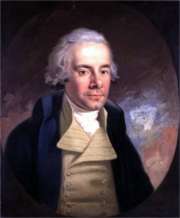 The current Year 5 national curriculum includes "the role that a significant individual or group played in shaping a colony", and “exploring the motivation and actions of an individual and group that shaped a colony.” In view of the highly significant role of religious motivation and influences, a range of individuals and groups who are so motivated should be directed to be studied so that students develop an awareness of the various influences that have shaped the colonies.
The current Year 5 national curriculum includes "the role that a significant individual or group played in shaping a colony", and “exploring the motivation and actions of an individual and group that shaped a colony.” In view of the highly significant role of religious motivation and influences, a range of individuals and groups who are so motivated should be directed to be studied so that students develop an awareness of the various influences that have shaped the colonies.
The unit could commence with a study of William Wilberforce, who was a member of the evangelical Clapham sect, and show how that group influenced the foundation of Australia. Wilberforce later influenced a number of people to come to Australia, some of whom are included in the lists that I have provided. A study of Wilberforce’s conversion and change in priorities could be a useful way of helping teachers and students understand religious experience and conversion. (See Piggin 2007).
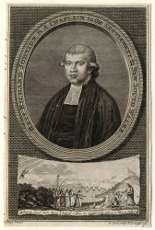 References might include "Belief in Action" a publication sent to all NSW primary schools in 2004 by the NSW Department of Education. From the following list, those marked with an asterisk may be found by referring to the "Belief in Action Document" (www.curriculumsupport.education.nsw.gov.au/primary/hsie/assets/pdf/belief.pdf). The people’s religious motivation is usually mentioned in a paragraph or two as part of a two page entry.
References might include "Belief in Action" a publication sent to all NSW primary schools in 2004 by the NSW Department of Education. From the following list, those marked with an asterisk may be found by referring to the "Belief in Action Document" (www.curriculumsupport.education.nsw.gov.au/primary/hsie/assets/pdf/belief.pdf). The people’s religious motivation is usually mentioned in a paragraph or two as part of a two page entry.
- *Rev Richard and Mary Johnson, first clergyman and his wife. This study also provides information on the early colony. (ADB)
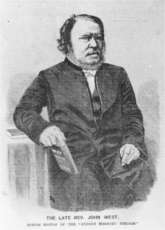 *Rev John West. Anti-transportation, pro Federation, Community action, editor Sydney Morning Herald. (ADB)
*Rev John West. Anti-transportation, pro Federation, Community action, editor Sydney Morning Herald. (ADB)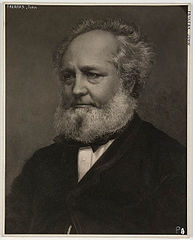 John Fairfax A deacon, businessman, newspaper proprietor, philanthropist, member of parliament, anti-transportation, pro Federation. Favourite motto ‘pray without ceasing’ [ADEB and ADB online]
John Fairfax A deacon, businessman, newspaper proprietor, philanthropist, member of parliament, anti-transportation, pro Federation. Favourite motto ‘pray without ceasing’ [ADEB and ADB online]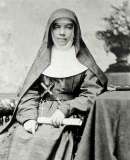 * Saint Mary MacKillop. Educator & Welfare. Founded order of nuns. (ADB)
* Saint Mary MacKillop. Educator & Welfare. Founded order of nuns. (ADB)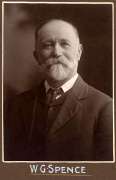 W.G Spence Trade unionist, politician, lay preacher. (ADB and ADEB).
W.G Spence Trade unionist, politician, lay preacher. (ADB and ADEB).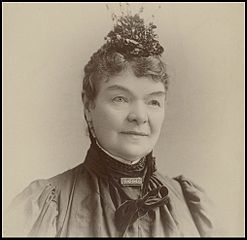 * Mary Lee Social reformer, suffragist. Began campaigning at about sixty years old. (ADB)
* Mary Lee Social reformer, suffragist. Began campaigning at about sixty years old. (ADB)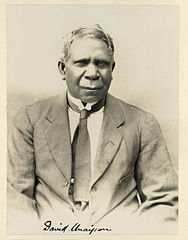 George & Martha Taplin. Missionaries. Recorded customs. Aborigines became evangelists including James Unaipon. His son David, educated on the mission, became a national spokesperson for Aborigines. (ADEB), (ADB)
George & Martha Taplin. Missionaries. Recorded customs. Aborigines became evangelists including James Unaipon. His son David, educated on the mission, became a national spokesperson for Aborigines. (ADEB), (ADB)- Nathaniel Pepper(c1841-77) Aboriginal evangelist and school teacher in Victoria. Preached in tribal language also. First Aboriginal Christian leader in the 1860s 70s. [ADB and ADEB]
Indoctrination?
Information about the facts of the religious components in our history is not the same as indoctrination. To quote the Rev Adjunct Professor John Moses: "Without ensuring religious influences are appropriately included children will come away with a completely sanitized and hence distorted version of our history and culture."
Warren Nord, an American philosopher of education (2010), says: To leave religion – as a live option – out of the curriculum cripples the ability of students to understand what is at issue; it makes secular ways of thinking the victor by default. It implicitly suggests that religion is a dead option, that students need not understand religion to understand their various subjects, that it is irrelevant to being an educated person. This is to take sides. (Nord p85)
Where religious motivation and people of religious conviction have played a significant part in shaping history, this should be acknowledged.
Aborigines and Torres Strait Islanders
Gore points out that Aboriginal missions have been omitted. "A warts and all approach" (Gore) would be an excellent way of helping students to understand something of the challenges involved in working on the mission field and some of the things that were achieved. This understanding could be applied to other issues.
Silence by teachers, means that children are likely to be aware only of the negative aspects of missions. They should be aware of the negative aspects but also be given some reasons for negatives where appropriate. The courage of some missionaries could be compared with the courage of some Australians in the defence force.
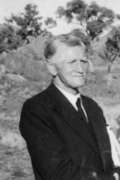 In building an awareness of the positive contributions of missionaries, the life of the Rev J R B Love is one to consider. Bob Love’s Christian faith was nurtured in the Presbyterian manse Strathalbyn S A, where his father ministered. A teacher, he worked on an Aboriginal mission before enlisting in the AIF in 1915. He was promoted to lieutenant. He was wounded and awarded the DCM and the MC in 1918 for conspicuous gallantry and devotion to duty. He studied for the ministry and worked as a missionary from 1922 to 1946. He was described as a model of manly Christianity. The policies that he advocated and implemented, respect for Aboriginal cultures, and languages, encouragement of Aboriginal decision making and holistic mission, were forerunners of policies accepted more widely in recent decades. (Rev Dr Bill Edwards “ Australian Dictionary of Evangelical Biography”). Bob Love’s bravery as a young man could be mentioned during the study of World War I. (See also ADB).
In building an awareness of the positive contributions of missionaries, the life of the Rev J R B Love is one to consider. Bob Love’s Christian faith was nurtured in the Presbyterian manse Strathalbyn S A, where his father ministered. A teacher, he worked on an Aboriginal mission before enlisting in the AIF in 1915. He was promoted to lieutenant. He was wounded and awarded the DCM and the MC in 1918 for conspicuous gallantry and devotion to duty. He studied for the ministry and worked as a missionary from 1922 to 1946. He was described as a model of manly Christianity. The policies that he advocated and implemented, respect for Aboriginal cultures, and languages, encouragement of Aboriginal decision making and holistic mission, were forerunners of policies accepted more widely in recent decades. (Rev Dr Bill Edwards “ Australian Dictionary of Evangelical Biography”). Bob Love’s bravery as a young man could be mentioned during the study of World War I. (See also ADB).
Conclusion
There is a need to continue discussions about what is not in the curriculum. There is also a need for teachers to build up their knowledge of people of religious motivation who have helped to shape Australia so that they can more adequately teach their students as well as more confidently discuss the subject with colleagues.
My submission on 19th century history which relates to Years 4 and 5 also includes comments by historians about the secular left liberal accounts of our history. These accounts have had undue impact on many people’s understanding of history. If you would like a copy of my submission and references, please contact me at: alecmills@midcoast.com.au.
References and Further Reading
- ADB refers to Australian Dictionary of Biography http://adb.anu.edu.au
- ADEB refers to Australian Dictionary of Evangelical Biography http://webjournals.ac.edu.au/journals/adeb
- Belief in Action: Support Material for K-6 Human Society and its Environment Syllabus. NSW Department of Education and Training Sydney 2004. http://www.curriculumsupport.education.nsw.gov.au/primary/hsie/assets/pdf/belief.pdf
- Ann Curthoys (2002) Freedom Ride: a freedom rider remembers Allen & Unwin Crows Nest http://www.arts.monash.edu.au/publications/eras/edition-5/fenwick.php
- John Gore “Does God make a difference?: An Australian perspective.” A review of Does God make a difference?: Taking religious conviction seriously in our schools and universities.http://www.tcfofnsw.org.au/htmarticles/difference.html
- John Gore “K-10 History – The devil isn’t in the detail”. http://www.tcfofnsw.org.au/htmarticles/History-devil.html
- John Gore “Religious education, brainwashing and faith” http://www.tcfofnsw.org.au/htmarticles/brainwashing.html
- Warren A Nord (2010) Does God make a difference? Taking religion Seriously in Our Schools and Universities. Oxford University Press New York http://books.google.com.au/books?id=qXTziqxDgEQC
- Stuart Piggin Spirit Word and World: Evangelical Christianity in Australia. Acorn Press. http://acornpress.net.au/publications/biography-history/spirit-word-and-world-evangelical-christianity-in-australia/
- Stuart Piggin (2007) “William Wilberforce, the Clapham Cabinet, and ‘Liberating the Captives’ in Australia” Lecture. Parliament House Canberra 26/7/2007. http://www.nswchurches.org/Resources/Articles/A07010_Piggin_William_Wilberforce.pdf
- Malcolm Prentis “Religion in Australian History”. Church Heritage, March 2010. [I have included Professor Prentis’s paper in a submission to the National Curriculum Review. If you are unable to obtain a copy I would be happy to email you a copy. alecmills@midcoast.com.au
- Teachers Christian Fellowship of NSW http://www.tcfofnsw.org.au/index.htm
- “A force to be reckoned with” by Noelene Martin on William Wilberforce. In the NSW School Magazine.
- Rev JRB Love photograph extracted from: Ara Irititja Project archive number Al 30678, JRB Love at Ernabella mission in 1943
Influential People
Those marked with * are referred to in the “Belief in Action” Document.
- *Rev Richard and * Mrs Mary Johnson Arrived 1788; Chaplain, education, farming
- *Rev Samuel Marsden Arrived 1794 Exploitation Pacific Islanders, convict women; NZ
- Edward Smith Hall Arrived c. 1812 Freedom of press, trial by jury,banking, social work
- Governor Lachlan Macquarie Arrived 1810 Implemented Wilberforce’s principles.
- *Rev John Dunmore Lang Arrived 1823 Education, self-govt, immigration, equal rights,
- Elizabeth Fry, [remained in England] In the early 19th century.
- Elizabeth Darling Arrived 1825 Female prisoners, Female School of industry for colonists
- John Plunkett Arrived 1831 Solicitor-General, Devout Roman Catholic, Manhood Suffrage
- *Father William Ullathorne Arrived 1833 Reports re convict system, anti-transportation
- *Bishop Bede Polding Arrived 1835 Leadership, Church expansion, help forsaken, education
- *Rev John West Arrived Hobart 1838 Federation, editor write - issues, community welfare,
- *Caroline Chisholm Arrived Sydney 1838 Women’s rights, Advocate Reforms, Roman Catholic
- John Fairfax Arrived in Sydney 1838 Newspaper proprieter, MP, Founder AMP, Deacon
- Charles La Trobe Arrived at Port Phillip 1839 Encouraged developments, Wilberforce ideas
- *Saint Mary MacKillop Born near Melbourne 1842 Education, welfare, one persons’ impact
- George and Martha Taplin Arrived 1849 Missionaries, evangelists,education,record custom
- James Unaipon Born about 1830 Evangelist, Assist record customs and stories
- Daniel and Janet Matthews Arrived in 1853 Missionaries. Rescued girls Mission Fellowship grew “people of substantial strength of character.” William Cooper & Pastor Sir Douglas Nicholls. (John Harris, One Blood; ADEB; Thinking Black by Attwood & Markus)
- *W G Spence arrived Victoria 1852 Trade Unionist, working conditions, lay preacher.
- *Jim McGowen arrived Melbourne 1855 Trade Unionist, Premier, pensions, women's suffrage
- William Cooper born 1861 near Echuca Vic. Aboriginal rights, Day of Mourning, Melbourne
- Kate Dwyer born 1861 (sisters Annie and Belle Golding)
- David Unaipon born Point McLeay Mission 1872. Aboriginal leader, evangelist & inventor
- *Mary Lee arrived Adelaide 1879. Social reformer and suffragist.
- Elizabeth Ward born Parramatta 1842 Woman’s Christian Temperance Union. Women’s suffrage, Federation, old age pensions, help prostitutes and sweated labour.